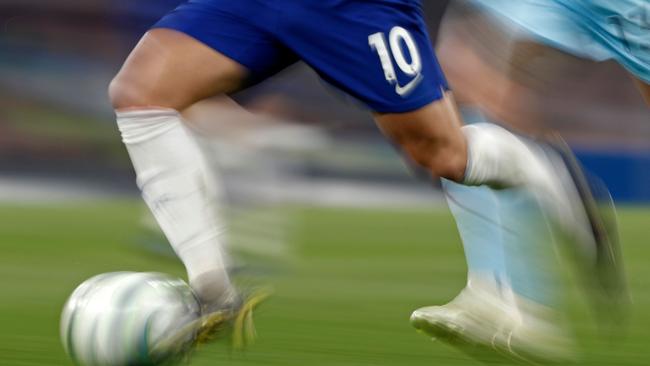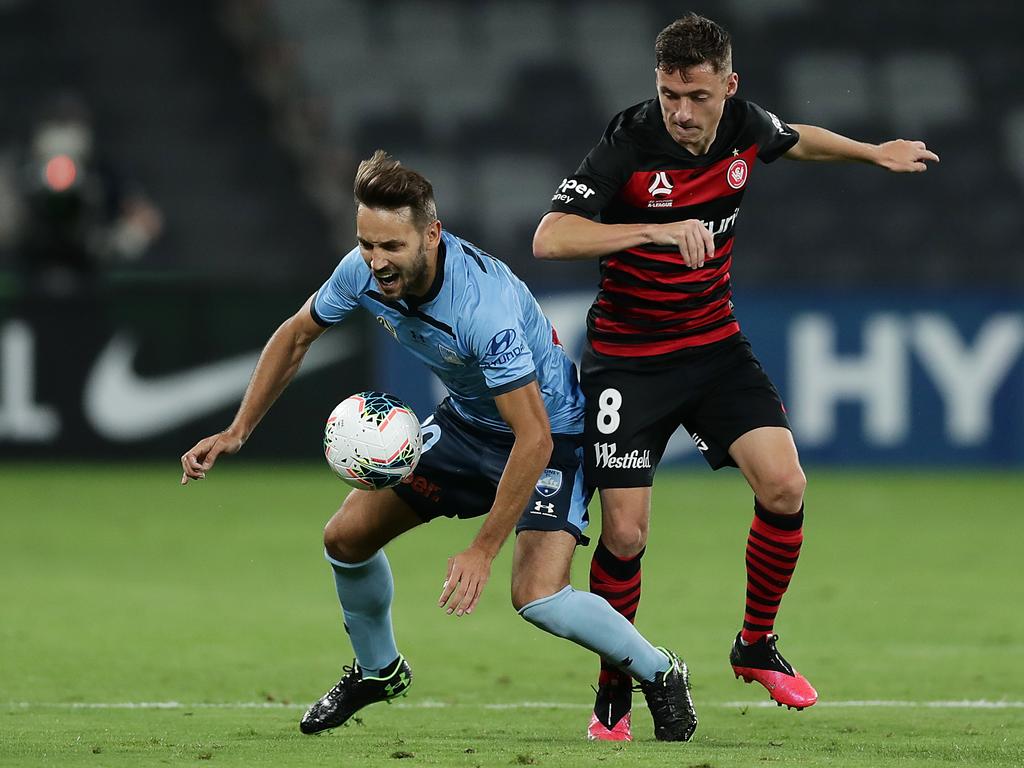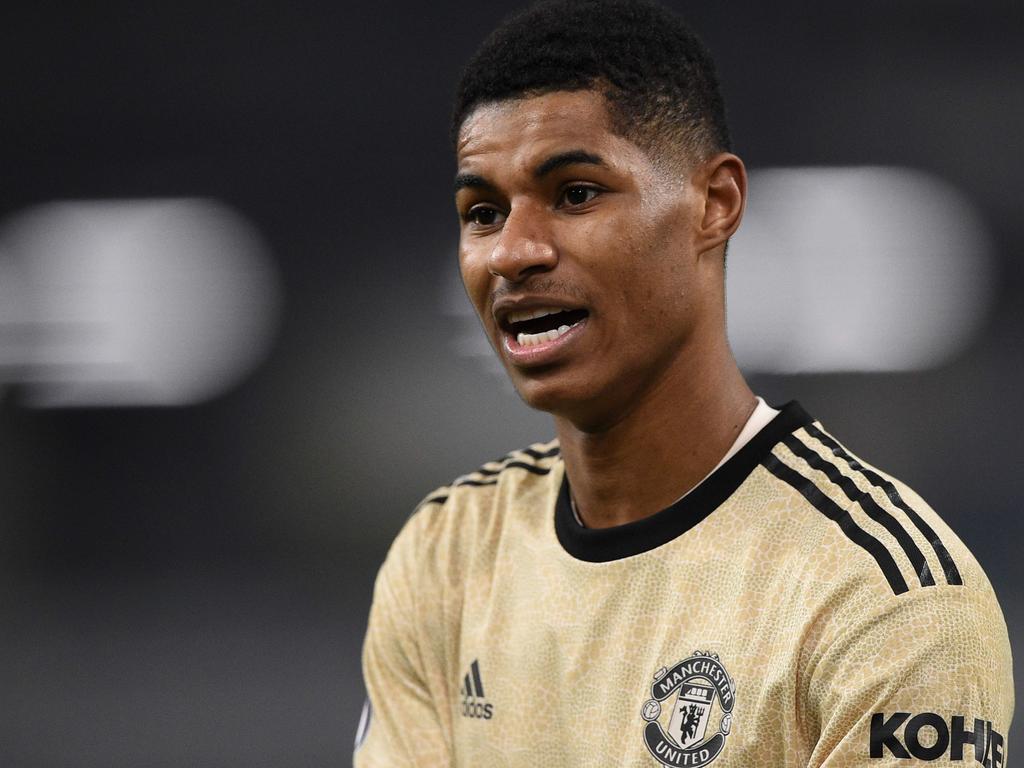English Premier League players will need time to get up to speed
At one EPL training ground, the moment had arrived. It was time to reunite the squad for their first 11-a-side training match since early March.

At one Premier League training ground, the moment had arrived. After two months of lockdown, and just over a week of non-contact work in small groups, it was time to reunite the squad for their first 11-a-side training match since early March.
The players were champing at the bit to express themselves, fly into tackles and string some passes together. But the reality was chastening. One player, who has spent time in England’s lower leagues, described it as one of the worst matches he had been involved in: a grim 0-0 with barely a shot on target.
Those scenes have probably been mirrored at clubs all over England, Italy and Spain. Restarting a highly complex team sport after a long shutdown is completely different from putting an Olympic cyclist back in the velodrome.
Clubs sometimes lose players to injury for months, and every other summer they have to tolerate national teams dragging them to a tournament for up to six weeks. But never before have they been faced with entire squads that have spent such a long time unable to play or train. England’s “Project Restart” is not a matter of simply switching the lights back on; there is a lot of work to do to rewire the circuits.
Players will be rusty. The instincts that are honed in match situations dull over a long period of inactivity. Russell Osman, the former England defender, played in the Leicester City team that went 35 days without a game during the harsh winter of 1986.
“You definitely lose your sharpness,” Osman says. “(Normally) you react very quickly to situations as the game’s going on. You haven’t really got time to think about what’s happening; if you start thinking about what’s happening, it’s usually too late.
“When you haven’t played competitively for weeks, you start to look at it, think about it, then try to react, and that puts you about half a yard the wrong side of where you need to be. If you compared it to a Formula One racing driver, say you’re not going to have a grand prix for six months, and you’re only going to have a week’s practice beforehand, you wouldn’t expect him to set any lap records. It’s the same with (football) fitness levels, no matter how much time you spend on the treadmill.”
During the lockdown, players were able to maintain their aerobic fitness, but that is only a small part of the equation. Football also depends on functional athleticism and – more than ever in the modern game – choreographed team movements and patterns, both in and out of possession.
Coaches such as Pep Guardiola and Jurgen Klopp, but also managers of bottom-half teams such as Southampton’s Ralph Hasenhuttl, preach “automatisms”: synchronised moves that are rehearsed over and over again until players can recreate them in matches without even thinking. Quick, slick, interconnected football is forged on training grounds that have lain empty for two months.
Magni Mohr, a former Chelsea fitness coach turned professor of exercise physiology who is part of the world-leading football research group at the University of Southern Denmark, has co-authored a paper on the challenges of resuming elite football.
“With top-class players, when they come back from holiday, one of the things they have lost the most is timing,” he says. “This is something that you can only work on, especially with high-level players, by playing 11-versus-11 games, or training with large groups in large spaces. It’s very demanding, so you need to invest time in it. Technical skill is also something that will have deteriorated.”
When the Premier League resumes on June 18 (AEST), teams will have had only three weeks of full training. Over the weekend, teams such as Arsenal, Chelsea and Manchester United ramped up their preparation by playing friendlies, and Tottenham are hoping to stage a game against Norwich City this week.
Even so, Mohr believes the football will be significantly different from what we are used to. “I think what we are going to see is markedly less intensity,” he says. “I also think we are going to see greater differences between teams with big squads and the lower-ranking teams. There is a close link between your fitness level and your ability to stay true to the tactical concept throughout the game. We will see a combination of (teams) changing (their) tactical approach, but also that players will not be capable of maintaining the same tightness.”
The teams that could be most vulnerable are bottom-half clubs with a relatively small squad but a demanding tactical concept. Brighton & Hove Albion, who under Graham Potter had been undergoing a radical tactical reboot before lockdown hit, stand out as one club that might be particularly disadvantaged.
Curtis Edwards, a midfielder with Djurgardens in Sweden who played under Potter at Ostersunds, does not expect his old manager to deliberately adjust his front-foot, possession-based approach, but thinks Brighton’s style could make the restart tougher.
“Graham is obsessed with how he wants to play. Monday to Friday is massive,” Edwards says. “He’d (show) us all week how we’re going to set up to dominate the ball. We did passing sequences in training. For players who are unfamiliar with it, it helps them become better in possession … (if) they’ve ended up under Chris Hughton or other managers who defend low and try to get goals at set pieces.
“Other teams will come back and the managers aren’t trying to implement their style on them. They know how they’re going to set up, they’re going to be deep. It’s definitely harder for Brighton, with Graham wanting them to dominate games and play good football. He hasn’t been there long, so they’re still learning.”
For players signed in January, the lockdown came at a particularly inopportune time. At Liverpool, for example, Takumi Minamino has missed out on two vital months of instruction in Klopp’s philosophy.
“It would be very hard for him,” says Oliver Kirch, who played under Klopp at Borussia Dortmund. “You need four or five months to internalise this style of football, before you feel fully integrated. He played a similar style at Salzburg, with a similar intensity and counter-pressing. But Liverpool is another level. The question is whether he can catch up.”
Underlying all this is the risk of injury. That implicit danger is heightened by the fact that players cannot warm up and down as usual due to the protocols that prohibit the use of most of their facilities. The Times has been told of one Premier League player who could be found doubled over in the front seat of his car after training, groaning about his hamstrings.
“The specific movement pattern, where you decelerate, accelerate and change direction – those small movements are extremely demanding at a muscular level,” Mohr says. “Hamstring and groin injuries will peak. In the Faroe Islands, they started up (the league) and have played four games, with a high number of injuries.”
Could there be any silver linings? With players having had more time to polish their individual skills, finishing in the Bundesliga has been red hot. Hertha Berlin, Bayer Leverkusen and Borussia Dortmund have seen their conversion rate jump several percentage points. As the Dortmund coach Lucien Favre put it: “We were able to work on things that we basically never work on any more.”
When the whistle blows on the Premier League’s resumption, our eyes will be drawn to the eerily deserted stands. But the game being played will probably, for the first few rounds at least, look somewhat different too. It’s football, but not as we know it.
THE TIMES





To join the conversation, please log in. Don't have an account? Register
Join the conversation, you are commenting as Logout